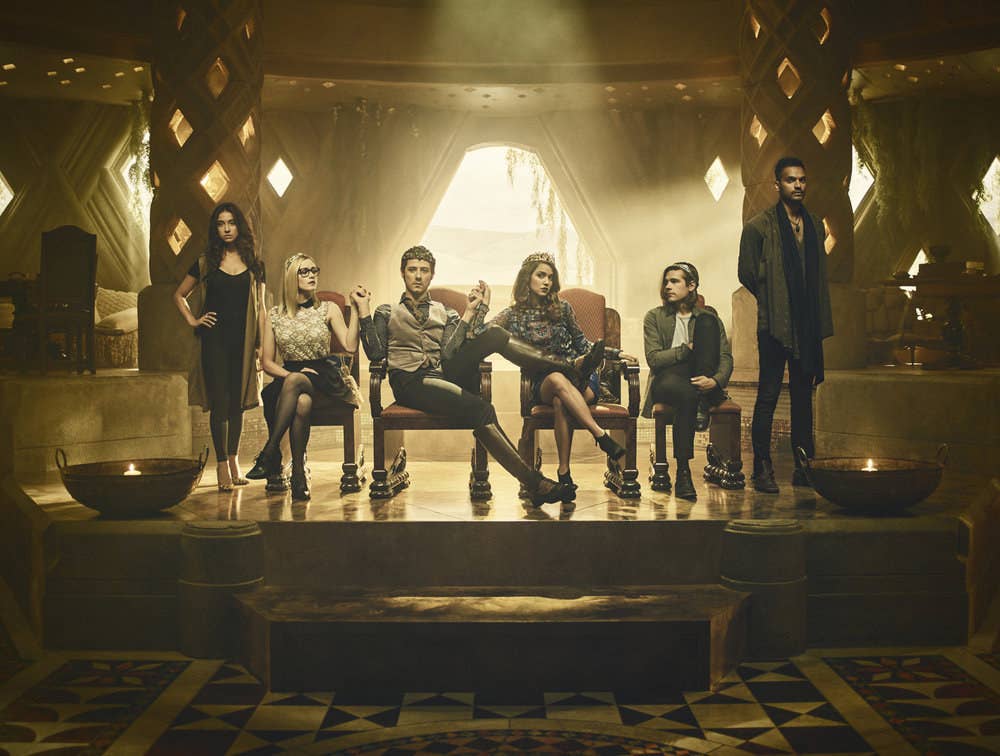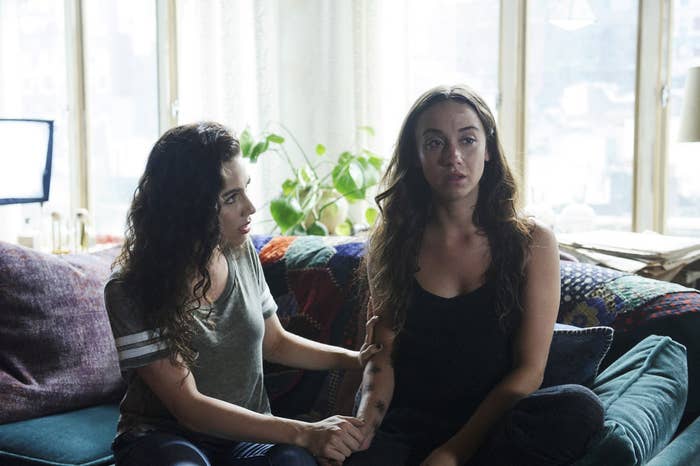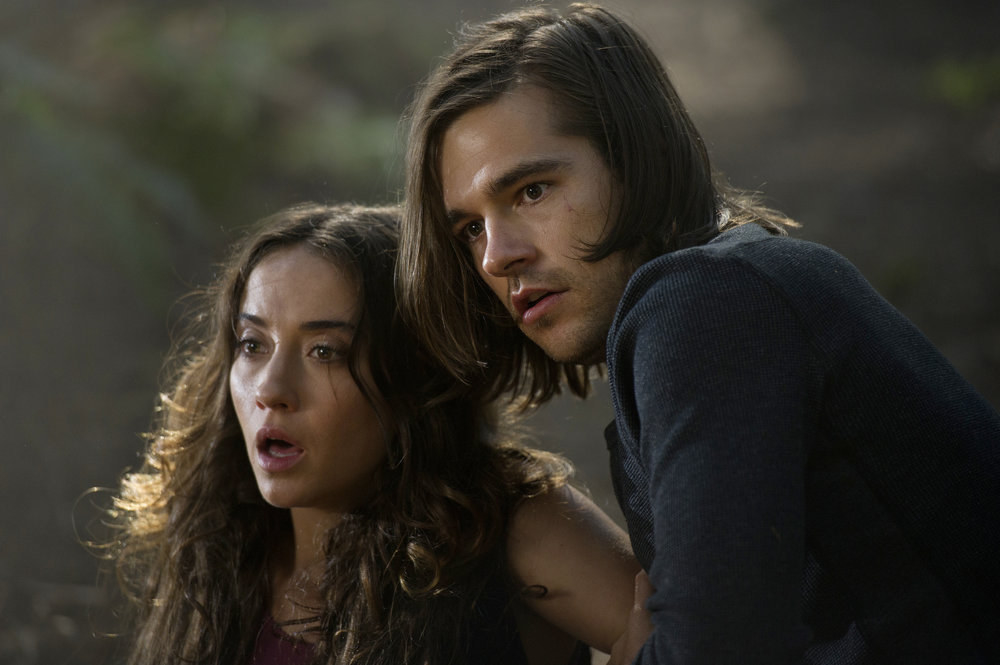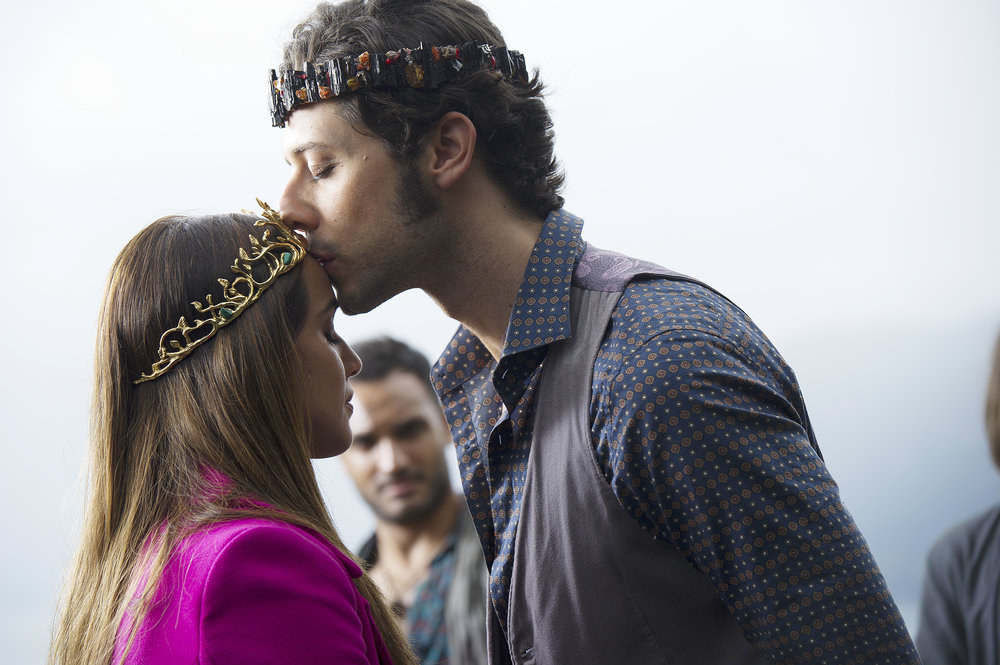
It might be a show about spells and the supernatural, but Syfy's The Magicians is also one of the realest, most politically relevant shows on TV right now. Based on Lev Grossman’s Magicians trilogy, the series has dealt with mental health, medication, colonialism, environmental issues, and, most recently, sexual assault and reproductive rights: The Season 1 finale last year ended with a brutal rape, and now the show is delving into the consequences of an unwanted pregnancy resulting from that assault.
The pregnancy is actually one way in which creators Sera Gamble and John McNamara have deviated from Grossman’s novels. When human hedge witch Julia (Stella Maeve) discovers she’s pregnant by her rapist — the fox-like demigod Reynard — she’s forced to go to extreme lengths to secure any kind of abortion, safe or otherwise. It's not an easy topic to tackle in an escapist fantasy television show, but then again, The Magicians doesn’t really use magic for escapism. “It’s not comfortable or fun for anyone to watch sexual violence, but I think that’s the reason to portray it,” Gamble told BuzzFeed News earlier this month.

Gamble and McNamara were firm in their decision to keep the rape as it happened in Grossman’s book, and it’s a scene that’s as difficult to watch as it is to read. “If we decided not to do that storyline for Julia, the message we might be sending is that rape is something you don’t talk about [and] don’t show on television,” Gamble said. “This is something we should all be screaming about, talking about, getting political about.”
Episode 5, which aired in February, portrays Julia's overwhelming anxiety upon learning she's pregnant. She screams, “Why won’t it just end? Why does it just keep getting worse and worse?” She hurls a positive pregnancy test across the room and, in the same breath, sighs, “What’s the spell to terminate it, or whatever?” Again, The Magicians doesn’t use magic for escapism; there’s no quick-fix abortion spell. “The real thing we’re trying to portray here is [that] this could have been a sexual assault by a teacher and a student — anyone powerful and someone powerless, that’s the whole point,” McNamara said. “And what’s more powerless-feeling than being left with this decision to raise your rapist’s child or abort it? That’s a very real thing that women, sadly, have had to face.” Gamble and McNamara wanted to make the storyline feel grounded despite the more fantastical elements of the show (like unicorn milk lattes, a talking sloth, and centaurs who double as doctors).
What follows the pregnancy revelation is a series of harrowing events that prevent Julia from procuring an abortion in a safe environment. Her evil magical fetus forces a doctor to stab herself in the eye with a speculum. Julia robs a bank to pay the $1 million bill for a specialty magical abortion (yes, seriously). It takes three full episodes for her to finally get a working procedure — performed by two magical Korean priestesses in the back of a literal butcher shop. “It’s the 21st century,” says Margo (Summer Bishil), Julia’s frenemy of sorts. “[It] shouldn’t be this hard for a girl to get an evil demigod abortion.”

And even after the abortion is completed, there’s a serious complication: Julia loses her “shade,” the tiny beating heart in the center of her body, the thing that defines her moral center — her soul of sorts. In Gamble’s mind, this storyline wasn't any kind of commentary on women losing their literal or figurative spirit should they choose to have an abortion. “What we’re saying is that when you can’t get the safe, simple version of the abortion and you literally have to go into a back room, then you can get hurt,” she said. It’s also not meant to be read as any sort of comeuppance. “We have no interest in punishing Julia — or any man or woman on the show — for living their lives in the modern world. That’s different than telling the story of the way the world punishes women like Julia. The world does punish women like Julia, incessantly, trying to destroy them.”
McNamara half-joked, “It feels like Oklahoma 2019.” But, indeed, the second season — which was written from March through October last year — feels seriously prophetic in the current political environment. Even in the magical Narnia-like land of Fillory where much of the season takes place, there’s a “Fillory Clinton” joke. “We thought Hillary Clinton was going to be president when [this season] aired,” Gamble sighed. “We would have used that [joke] more if she had won.”
According to McNamara, Donald Trump was also an unavoidable factor in shaping the season, even as he was still a presidential hopeful. “Trump was definitely in the air,” he said. “He was lowering the bar of discourse, honesty, civil rights, racial rights, and obviously sexual rights; the right to have sex without being shamed, unless of course you’re a man. It couldn’t, then, help but seep into what you’re working on.”

McNamara doubts the show will seriously change any political narrative in real life, nor does he think it should. “What we do as entertainers is reflect the culture,” he stressed. “We don't, in any way, steer it. I’ve never seen anything in a movie, a play, a book, a song, steer the culture. I don't think Shakespeare sat around and was like, ‘Ehh, will Hamlet create a really bad king? Am I saying falling in love leads to death in Romeo and Juliet?’ All [an artist] should think about is, Does this feel emotionally real? Period.”
Regardless, The Magicians will purposely veer toward the political for the rest of the second season — especially in the finale, which deals with the dangers of complete, unchecked power. It’s not a new theme for the show (the entire first season revolved around a moth-faced monster who had the ability to immobilize both time and humans so he could do with them as he wished); however, it is an idea that feels oddly charged right now.
“It’s even Trumpier than you think,” Gamble said about the forthcoming 13th episode. “And when you get to it, know that we did that on purpose. We were talking about [Trump] in the room when we wrote the scenes.”
McNamara nodded, adding that they discussed “the idea that the worst kind of leader to have is not someone who's evil and determined to do something [or] someone who’s good but fails.” The worst kind of leader, he said, is “someone who doesn't give a flying fuck, an anarchist, someone who would rather just watch the world burn like a toy.”
